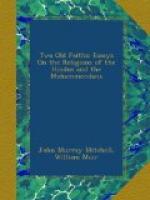[Sidenote: Inconsistencies between Mr. Sen’s public and private utterances. Mr. Sen’s policy of reserve.] It was not easy to reconcile Mr. Sen’s public utterances with his private ones—though far be it from us to tax him with insincerity. Thus, in an interview extending over two hours, which the writer and two missionary friends had with him a week or so before the lecture now referred to, he said he accepted as true and vital all the leading doctrines of the Christian faith, with the exception of the resurrection of Christ. But another fundamental difference remained—he avowedly dissented from the orthodox creed in rejecting the miraculous element in Scripture. At an interview I had with him some time before he earnestly disclaimed all intention to put Christ on a level with Buddha or Mohammed. “I am educating my friends,” he said, “to understand and approve of Christianity; I have not yet said my last word about Christ.” It is a solemn question, Had he said it when his career was ended? If so, it was far from a satisfactory word. His policy of reserve and adaptation had probably kept him from uttering all that was in his heart; but it was a sorely mistaken policy. Had he temporized less he would have accomplished more.
Since the death of Mr. Sen there has been a violent dispute between his family and the “Apostolic Durbar,” on one side, and one of his ablest followers, on the other; and the New Dispensation will probably split in two, if it does not perish altogether.
[Sidenote: The Sadharan Samaj.] In the meantime, the Sadharan Samaj, which broke off from Keshub’s party in 1878, has been going on with no small vigor. Vagaries, either in doctrine or rites, have been carefully shunned; its partisans profess a pure Theistic creed and labor diligently in the cause of social reform. Their position is nearly that of Unitarian Christianity, and we fear they are not at present approximating to the full belief of the Church Catholic.
[Sidenote: Movements in western India. Tenets of the Prarthana Sabha.] Very similar in character to the Brahmo Somaj is the Prarthana Somaj in western India. As far back as 1850, or a little earlier, there was formed a society called the Prarthana Sabha (Prayer-meeting). Its leading tenets were as follows:
1. I believe in one God. 2. I renounce idol-worship. 3. I will do my best to lead a moral life. 4. If I commit any sin through the weakness of my moral nature I will repent of it and ask the pardon of God.
The society, after some time, began to languish; but in 1867 it was revived under the name of Prarthana Somaj. Its chief branches are in Bombay, Poona, Ahmedabad, and Surat.
[Sidenote: Arya Samaj.] An interesting movement called the Arya Samaj was commenced a few years ago by a Pandit—Dayanand Sarasvati. He received the Vedas as fully inspired, but maintained that they taught monotheism—Agni, Indra, and all the rest being merely different names of God. It was a desperate effort to save the reputation of the ancient books; but, as all Sanskrit scholars saw at a glance, the whole idea was a delusion. The Pandit is now dead; and the Arya Samaj may not long survive him.




